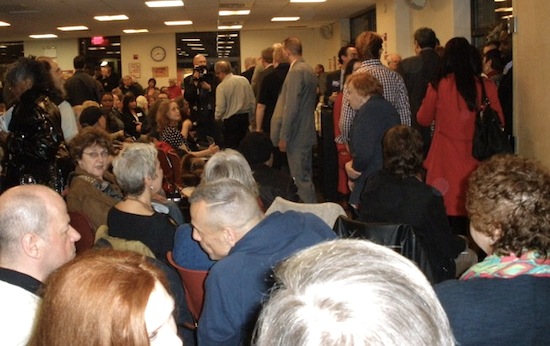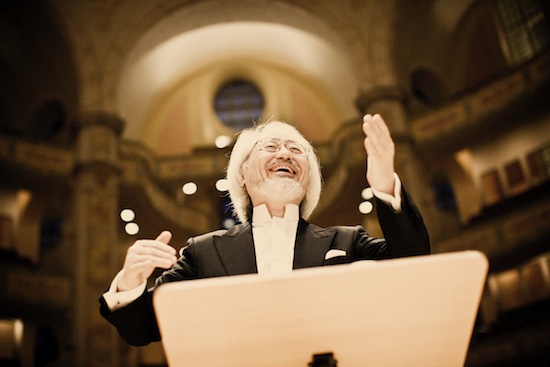By Maria Dering
On Thursday evening, a capacity crowd gathered at the Goddard-Riverside Community Center to hear five Democrat Mayoral candidates debate key issues. The candidates are: Sal Albanese, former NYC Council Member; Bill de Blasio, NYC Public Advocate; John Liu, NYC Comptroller; Christine Quinn, Speaker, NYC Council; and William Thompson, former NYC Comptroller. Each candidate made a two-minute opening statement and then took a series of ten questions from the moderator, Dr. Ken Sherrill, Professor Emeritus of Political Science, Hunter College.
After opening remarks from Tim Foley, President of Community Free Democrats, and a welcome from Assemblymember Linda Rosenthal (67th Assembly District), the candidates were asked what they would do if elected Mayor. Throughout this article, candidates are listed in the order in which they spoke. The highlights of each answer are given.
William Thompson: Make sure NYC stays safe; don’t sacrifice our constitutional rights, end the misuse of “stop and frisk.” NYC schools need an educator at the head. Help small businesses to grow rather than taxing and fining them. Start to build real affordable housing.
Christine Quinn: Expand affordable housing to all five boroughs. Add 10,000 new seats in NYC kindergartens. “Make NYC an even greater place of opportunity for the middle class and those striving to get there.”
John Liu: Reduce wasteful spending, create jobs, bring the “wealth gap” under control, embrace opportunities for growth, and make sure that “prosperity is shared by everybody.”
Sal Albanese: Establish universal pre-Kindergarten; stop teaching “to the test”; establish pediatric wellness centers especially focused on the first three years of a child’s life; create more jobs. “Poverty is the problem.”
Bill de Blasio made no opening remarks as he arrived at 8:40 p.m.
The moderator then moved on to ask each candidate to answer ten questions, including several from the audience and one from Twitter. Each candidate was given one minute (often running over) to answer each question.
Question 1: Do you think that the Open Meetings Law should apply to organizations that get funding from “member items”?
Albanese: Eliminate member items. Member items are what council members dole out every year to community groups on a discretionary basis, sometimes there’s corruption and fraud. There are some great member items that help communities, but I think that we have this pocket of money that should be doled out. Let’s eliminate member items … and we’ll see some of the corruption issues that you see in the press lately diminish.”
de Blasio: I believe in the Open Meetings Law … and in all reforms that came from the Watergate era, Freedom of Information Act, etc. Everything that is publicly funded and supported should be based on those principles. [Member items are sometimes] being used as a tool of political retribution … I propose an end to member item money replaced by participatory budgeting at a community level.
Liu: The Open Meetings Law should apply to organizations or anybody that gets taxpayers’ money. Go to checkbooknyc.com; go online and see every single expenditure [by the city] This level of transparency allows for a clear disclosure of all the money that’s being used and spent.
Quinn: Transparency is the best thing that you could bring to any system. As this relates to the Open Meetings Law, all of the entities that are funded from discretionary funding (places like Goddard Riverside … after-school programs, PTAs) have to have openness in the sense that anyone can come and participate. As long as the organization could have the opportunity to go to Executive Session to discuss confidential or personnel matters, I wouldn’t have a problem with that.
Thompson: When it comes to every city dollar, every taxpayer dollar, we need to have transparency and openness and this should be no different. Highest level of scrutiny should be paid to discretionary dollars.
Question 2: Community centers like Goddard Riverside … are often caught in the middle of an annual budget dance usually choreographed by majors and used as bargaining chips. How will you end this shameful process and ensure adequate stable funding for community centers and social service agencies? How do you feel about these agencies’ dependence on member items as a source of vital funding?
Quinn: Mayor cuts every program the City Council put in or restored the year before (funding for libraries, senior centers, middle school extra initiatives etc.) Creates an almost false budgeting where you’re fighting over restoring things when there is enough money, and other times when we have financial crises, the numbers balloon tremendously. Solution: Get more items into the city’s baseline, get the budget in compliance with the City Charter … every allocation should have it own unit of appropriation.
Liu: The “budget dance” is purely wasteful. Every year, the Mayor proposes a budget that slashes important things … starts this cha-cha by saying we don’t have enough money for this. Then the council members weigh in with their foxtrot … and then the salsa begins on the steps of City Hall with community members … camped out, protesting cuts. Then months later the Mayor and the Council Speaker waltz in with a miraculous deal … all the things that were proposed to be cut were actually not to be cut. It focuses the public on $2-$4 million a year of a total budget of $70B per year.
de Blasio: Focus on where the real money is. For community-based organizations, the real action is in the RFP (request for proposal) process, funding streams, that’s where they live or die. Budget dance is a tool of political control … to keep everyone in line. I would end the political rules where we allow a Mayor and a Speaker to dominate the process.
Albanese: Let’s end this nonsense by instituting baselines. Ban campaign contributions from people who are receiving nonprofit funds from the city of NY. Eliminate stipends for chairing a committee.
Thompson: We need to have a Mayor who “just says no.” We’re not going to do this, we’re going to be honest with the people of the City of NY. The budget dance doesn’t allow for real budgeting for organizations like this [Goddard-Riverside].
Question #3: Via Twitter. When you’re Mayor, what will the first Bloomberg policy you plan to change?
Liu: Let’s start with the schools. Public schools are being operated as business divisions reporting up to DOE Corporation. We need to stop this nonsense of school closures and co-locations … reduce over reliance on high stakes, once a year exams. Make sure our children are learning.
de Blasio: I think we should tax the wealthiest New Yorkers — those who make a half-million dollars per year or more — so that we can have full day universal pre-K for every single NYC student and … an after-school seat for every middle school child who needs it. Our wealthy friends … will pay 2K more a year so that we can have good schools. They won’t leave.
Albanese: Focus on real issues, pediatric wellness center, up to 3 years of age. Pre-K. Small class size. Education is my top priority. (Referred to Harlem Children Zone Baby College.) Better training for teachers, real student teaching experience.
Thompson: Put an educator at the top of the school system again, not like Joel Klein or Cathy Black. (Audience booed at mention of Klein). Stop school closings. Mayor said he’ll open 76 new schools in fall 2013. But how many were closed? Only two are really new schools, the rest are re-openings.
Quinn: Bring the power of the rent laws back to NYC. Return rent stabilization to what it was. Make sure there is enough rental housing for middle class in all boroughs. Expand housing options. Restore programs that give homeless people a way out of shelters.
Question #4: Lightning Round
What borough do you know best?
3- Brooklyn (Albanese, de Blasio, Thompson)
1 – Queens (Liu)
1- Manhattan (Quinn)
Question #5: Lightning round
When did you last live in a rental and what do you pay?
Albanese – $60/month 1969
de Blasio – $1,800/month 1992-8
Liu – $700/month, 1993
Quinn – $2,000/month 2009
Thompson – $600/month 1982
Question #6: Support or oppose the commuter tax?
All candidates answered yes, especially to be used to support mass transit in NYC.
Question #7: Is NYC a melting pot or a gorgeous mosaic?
All said it is a gorgeous mosaic
From the audience: How about some real questions?
Question #8: Can you represent the interests of tenants when you take contributions from developers?
Of all the questions posed, this one received the least specific answers.
Thompson: Your record talks about this. We worked to make sure people weren’t pushed out of Mitchell Lama (housing). (Sidestepped the question with his answer “What do you believe in?”) Not a question of dollars or developers. It’s a question of standing up and fighting for those who need to be fought for.
Quinn: I want to be known as “tenants’ mayor.” Give extra attention to buildings in worst state. Continue to support aggressively pro-tenant laws. We need a complete overhaul of the housing maintenance laws. Require owners to fix the underlying problems in your building. Crack down on unscrupulous landlords.
Liu: Two-thirds of NYC residents are renters. Spike in rents deemed unaffordable by the Federal government. Doesn’t accept money from developers who do business with the city.
de Blasio: Referred to the Worst Landlords Watch List, an extraordinary tool for helping tenants. Didn’t answer question.
Albanese: The infusion of huge dollars creates conflicts of interest. Doesn’t accept “a dime” from developers, like Liu. “Big money is corrupting our politics.” Wants to raise campaign funds from average New Yorkers.
Question #9: Three of the fourteen new buildings that NYCHA proposes for “infill development” are in Douglass Houses. What steps will you take as Mayor to stop this program? How do you strike a balance betw. economic development and a livable city?
Liu: The premise behind the program is a sham. NYCHA was sitting on $42 million last year that could have been used to install security cameras. (Dollar amount was corrected to $84 million). NYCHA was sitting on $1B of capital funds. Now they claim poverty that infill will generate $30-50 mill/year. Need to manage better.
de Blasio: Move public housing to front and center. He disagreed with Liu: “I think NYCHA is hurting; they have lost huge amount of Federal funding.” Hurricane Sandy was incredibly damaging. “The Bloomberg proposal cannot be trusted.” De Blasio advocated checks and controls, jobs for NYCHA residents in the progress, bring in more money.
Albanese: The tenants at Douglass don’t trust NYCHA, don’t trust city. Need to reestablish rapport and trust between tenants and city fathers. “Bloomberg is starting to sell off public assets: schools, libraries.” Selling off assets to build luxury condos is wrong, must be stopped.
Thompson: Infill is a sham. This is a process where the city leases public land for 99 years to developers for luxury housing. “Years ago, we gave away the land.” Advocated repair of NYCHA units and not giving away precious public land.
Quinn: No question that auctioning off NYCHA housing to the highest building is a terrible idea. We must use remaining land in highest and best way.” Not one tenant association or community board affected has been able to given any input. Call to action: There might be a RFP to developers that goes out at the end of April for developers to tell how much they’ll pay to develop luxury housing. Stop this proposal and stop it right now.
Question #10: How do you make certain that all New Yorkers exercise their right to vote?
Thompson: Make it possible to vote on weekends. vote on multiple days, vote earlier. We need a shorter wait time for registration.
Liu: [Missing his comment in my notes.]
Quinn: Agreed with Thompson: make it convenient.
de Blasio: Noted “voter suppression with a velvet glove”; no specifics.
Albanese: Political machines want to keep people from voting. Turnout in this district only 7% in 2008. Solution: a professional Board of Elections, not a patronage office










Was Anthony Weiner there? I didn’t see any shirtless people.
No Weiner sightings on Thursday.
We invited only those Dem mayoral candidates who are filed as candidates.
Thanks for sifting through the theatrics to tell us what was said and what was avoided.
Wow – they are such panderers. – especially Quinn and De Blasio.
Quinn you know not all landlords are bad – they built this city. And not all tenants are good. Stop pandering , we can handle the truth.
and De Blasio we are taxed enough thank you.
There was no question from the community about spending a fortune to turn the west 90s into an homeless encampment?